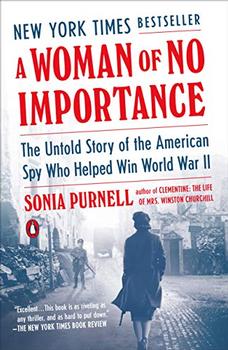Summary | Excerpt | Reading Guide | Reviews | Beyond the Book | Readalikes | Genres & Themes | Author Bio

The Untold Story of the American Spy Who Helped Win World War II
by Sonia Purnell
Yet that is perhaps how Virginia would have wanted it. She operated in the shadows, and that was where she was happiest. Even to her closest allies in France, she seemed to have no home or family or regiment, merely a burning desire to defeat the Nazis. They knew neither her real name nor her nationality, nor how she had arrived in their midst. Constantly changing in looks and demeanor, surfacing without notice across whole swaths of France only to disappear again as suddenly, she remained an enigma throughout the war and in some ways after it too. Even now, tracing her story has involved three solid years of detective work, taking me from the National Archives in London, the Resistance files in Lyon, and the parachute drop zones in the Haute‑Loire, to the judicial dossiers of Paris and even the white marble corridors of CIA headquarters at Langley. My search led me through nine levels of security clearance and into the heart of today's world of American espionage. I have discussed the pressures of operating in enemy territory with a former member of Britain's Special Forces and ex‑intelligence officers from both sides of the Atlantic. I have tracked down files that were missing, and discovered that others remain mysteriously lost or unaccounted for. I have spent days drawing diagrams matching dozens of code names with scores of her missions; months hunting for remaining extracts of those strange "disappeared" papers; years digging out forgotten documents and memoirs. Of course, the best guerrilla leaders do not intend to keep future historians happy by keeping perfect records at five in the morning about their overnight missions, and those that do exist are often patchy or contradictory. Where possible, I have stuck to the version of events as told by the people closest to them. At times, however, it has been as if Virginia and I have been playing our own game of cat and mouse; as if from the grave she remains, as she used to put it, "unwilling to talk" about what she did.
In her secret universe, when virtually the whole of Europe from the North Sea to the Russian frontier was under the Nazi heel, trust was an unaffordable luxury. Mystique was as vital as a concealable Colt pistol. And yet, in an era when the world again seems to be tilting toward division and extremism, her example of comradeship across borders in pursuit of a higher ideal stands out now more than ever.
Nor have governments made it easy to fill in the gaps. Scores of relevant documents are still classified for another generation—although I managed to have a number released to me for this book with the invaluable aid of two former intelligence officers. Still more went up in flames in a devastating fire at the French National Archives in the 1970s, leaving an unfillable hole in the official accounts. Whole batches of papers at the National Archives and Records Administration (NARA) in Washington, D.C., have apparently been mislaid or possibly misfiled, a handy list of them apparently overlooked in a move between two buildings. Only 15 percent of the original papers from Special Operations Executive—the British secret service that Virginia worked for from 1941 to 1944—survive. Yet for all these challenges and twists and turns down dark and hidden alleys, Virginia's story has never once disappointed: in fact, it has repeatedly turned out to be more extraordinary, its characters more vivid, its significance greater than I could have imagined. She helped to change espionage and the views of women in warfare forever—and the course of the fighting in France.
Virginia's enemies were more deadly, her conduct more daring than many a Hollywood blockbuster fantasy. And yet the swashbuckling tale is true, and Virginia a real‑life hero who kept going even when all seemed lost. The pitiless universe of deception and intrigue that she inhabited might have inspired Ian Fleming to create James Bond, yet she came closer to being the ultimate spy. Eventually every bit as ruthless and wily as the fictional Commander Bond, she also understood the need to blend in and keep her distance from friend and foe alike. Where Bond was known by name to every international baddie, she slipped through her enemies unseen. Where Bond drove a flashy Aston Martin, she traveled by train or tram or, despite her disability, on foot. Where Fleming's character seemed to rise seamlessly to the top, Virginia had to battle for every inch of recognition and authority. Her struggle made her the figure she became, one who survived, even thrived, in a clandestine life that broke many apparently far more suited to the job. No wonder today's chief of the British intelligence agency MI6, has revealed that he searches for recruits who do not shout loud and show off but who have had to "fight to get on in life."
Excerpted from A Woman of No Importance by Sonia Purnell. Copyright © 2019 by Sonia Purnell. All rights reserved. No part of this excerpt may be reproduced or reprinted without permission in writing from the publisher.
A classic is a book that has never finished saying what it has to say
Click Here to find out who said this, as well as discovering other famous literary quotes!
Your guide toexceptional books
BookBrowse seeks out and recommends the best in contemporary fiction and nonfiction—books that not only engage and entertain but also deepen our understanding of ourselves and the world around us.